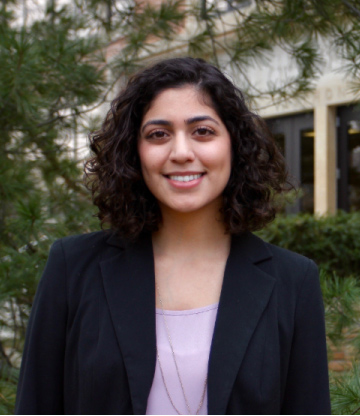Clinical Science graduate student receives the Caldwell Award
April 9, 2024 - Shelly DeJong
 Alexandra Vazquez, a psychology graduate student in the Clinical Science area, was awarded the Bob and Bets Caldwell Land Grant Values Award for her notable record of service-oriented research, mentorship, and community involvement.
Alexandra Vazquez, a psychology graduate student in the Clinical Science area, was awarded the Bob and Bets Caldwell Land Grant Values Award for her notable record of service-oriented research, mentorship, and community involvement.
The Caldwell award recognizes a psychology graduate student who exemplifies public-spirited attitudes and actions that encourage bridging divides to discover unity in common purpose and to be a positive force for hope and possibilities.
“We are proud to have Alex represent our graduate program,” said Dr. Ann Marie Ryan, director of the psychology graduate programs. “Alex’s nominators – peers, faculty and community partner – noted her dedication to service, her elevation of marginalized individuals within our community, her high-quality mentorship, as well as her own research focus.”
Vazquez’s research focuses on the origins and development of resilience, and identifying factors that help individuals from historically disadvantaged backgrounds overcome environmental adversity. In addition to her research, Vazquez co-chairs the Clinical Area’s Diversity Sciences Committee and has been active in The Alliances for Graduate Education and Professoriate (AGEP). For years, she has also been dedicated to mentoring undergraduate and graduate students.
“It’s such an honor to get this award and to be recognized for the work that I’ve been doing for the past few years,” said Vazquez. “I could not be where I am today without a lot of the support from my community and from different mentors that I've had. I really try to pay that forward to my peers and to students that are carving out a path of their own."
Research & Mentorship
Originally from Chicago, Vazquez was in the McNair Scholars program at DePaul, which helps prepare first-generation students for further education. Vazquez credits that mentorship as crucial to her success.
“I really needed that support to move beyond an undergraduate education and pursue graduate studies. That mentorship was invaluable for me,” said Vazquez. “Now that I’m in graduate school, I really try to help undergraduates by exposing them to research and helping them with their applications to graduate school. I find it really rewarding to give back.”
As an undergraduate student, Vazquez worked with her mentor, Dr. Cecelia Martinez-Torteya, an alum of the MSU Clinical Science program, to study the socio-emotional development of children. As a post-baccalaureate, she also worked on the Violence Prevention Project at DePaul University’s Center for Community Research, which worked to implement and assess an intervention to promote well-being among high school students in the Chicagoland area, particularly in urban, low-income areas.
As a graduate student, Vazquez works with Dr. Alex Burt, the co-founder of the MSU Twin Registry. They use behavioral genetics methods to narrow in on environmental and genetic factors influencing youth resilience. In her second year, Vazquez was awarded a Graduate Research Fellowship for her master's thesis project through the National Science Foundation. Last year, Vazquez was awarded a National Research Service Award for her dissertation project through the National Institute of Health which allowed her to stay for a 6th year in the Clinical Science program to do further research.
As the co-chair of the Clinical Area’s Diversity Sciences Committee, Vazquez has worked to create a space for conversations about diversity, equity, and inclusion within their program. They’ve also tried to increase initiatives—including successfully proposing a new DEI brown bag series that will begin in the fall.
Last year, they also made community service a part of their mission. After exploring potential collaborations, they began working with Haven House, a local organization that supports unhoused families. They’ve run charity drives and have also used their clinical expertise to train staff on how to navigate interpersonal challenges, assess therapy needs, and make therapy referrals.
Recently, Vazquez matched for an internship with a medical center called Denver Health, the biggest safety-net hospital in Denver that works with under resourced folks and underserved populations. She’ll be working with substance use populations, as well as having the opportunity to work with Spanish-speaking populations.
“A lot of the research that I work on can take years to see any effect. Being able to do something where you can see an immediate effect in your community is important to me. It really drives me,” said Vazquez. “I’m in a very privileged position where I can leverage my expertise, time, and knowledge to help the community. That’s something I’m passionate about.”

